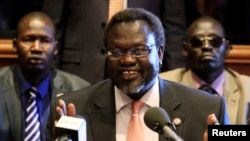A South Sudanese rebel official said there can be no lasting peace in the country as long as President Salva Kiir is at the helm of government.
Ezekiel Lol Gatkuoth, former South Sudanese ambassador to the United States, said Kiir is a symbol of disunity that does not enjoy the support of majority of South Sudanese.
There were reports Monday that the warring parties had signed a cessation of hostilities agreement, but in a statement issued Thursday the rebels said they were not part of the negotiations and that their leader, former Vice President Riek Machar, did not sign the agreement.
Gatkuoth said mediators of the regional group Inter-Governmental Authority on Development (IGAD) presented a blank document to Machar to sign, but he refused to do so without the text.
“Our position is clear that, first, we must negotiate [between the] two warring parties so that we can reach an agreement and then sign it, and then the IGAD leaders should be the ones to witness and not the other way around. So, that agreement, which was signed in Addis Ababa, the two parties did not negotiate this agreement. And, basically, Dr. Riek Machar was not given the text together with Salva Kiir. They just told to sign here, as if they were being given a blank check,” he said.
Kiir’s government has blamed the rebels for consistently violating previous agreements, but Gatkuoth said the government has been the aggressor from the start of the conflict.
“When the crisis started, we were in Juba. But, they have pushed us all the way to Nasir. We were in Bor, they took Bor; we were in Bentiu, they took Bentiu; we were in Malakal, they took Malakal. So, who’s actually aggressing? It is the government under Salva,” he said.
IGAD, which has been mediating the talks, has called on Kiir and Machar to form a unity government within 45 days.
Gatkuoth said a unity government is possible because both leaders know there’s no military solution to the conflict.
“A unity government can be formed because we believe that this war cannot be won militarily by Salva. So, for us, I think there’s a possibility of having an agreement because the voices of the majority in South Sudan [say] they want peace, and 80 percent of the people of South Sudan [say] they are not happy with what is happening in their country under Salva Kiir. So, Salva is not a uniting factor; he is a dividing factor,” Gatkuoth said.
Gatkuoth said a majority of South Sudan’s internally displaced people are afraid to return home with Kiir in power.
He said that although the rebels are not satisfied with the IGAD mediation process, they are committed to it because they believe Africa’s problems must be solved by Africans.
Gatkuoth also said IGAD mediators should stop legitimizing Kiir. He said peace can only come to South Sudan when there is a total transformation of the country. He went on to say IGAD-mediated negotiations should deal with “substantive” issues, including security sector reform, governance and federalism.
The South Sudanese army Wednesday accused rebels of shooting down a U.N. helicopter Tuesday in Bentiu. Gatkuoth said the rebels are not operating in the region where the helicopter went down.
“The U.N. said it is a crash. We are not there in the place where it crashed. It is controlled by the government. So, how come the government just jumped up and said that it was us who did something to that aircraft?” Gatkuoth said.
He called for a “thorough” investigation to determine the truth. The U.N. said Wednesday the helicopter was brought down by an “attack,” but did not issue blame for the crash that killed three Russian crewmembers and injured a fourth.








